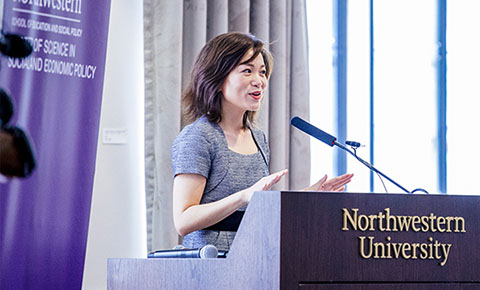New Grant Assesses Ending the Subminimum Wage

Northwestern University economist Michelle Yin has received a $4.29 million grant from the US Department of Education to assess a Virginia intervention designed to end the practice of paying less than the minimum wage to people with disabilities.
The Real Pay for Real Jobs, an EPIC (Education, Partnerships, provisions of Individualized Services, and Capacity Building) Model Project, is an effort by the Virginia Department of Aging and Rehabilitative Services to eliminate the longstanding but legal practice of paying a subminimum wage and support employment and economic independence for Virginians with disabilities.
In her role, Yin will lead all aspects of the evaluation of the intervention, including whether it can be replicated and scaled. Her research will also include a cost-benefit analysis to measure return on investment and financial impact. (Learn more about a lead economist/research analyst position that will support the grant. )
“Subminimum wages create structural inequalities that perpetuate false stereotypes about the ability of people with disabilities to meaningfully participate in work and to contribute within their communities,” Yin said. “In addition, subminimum wage practices enable employers to unethically profit from the exploitation of workers with disabilities.”
For decades, the merits of supported and sheltered employment for those with disabilities have been hotly debated. People with disabilities are significantly more likely to be unemployed or underemployed compared to peers without disabilities.
When they do work, they are often paid less. Data from 2018 to 2020 estimates that between 321,131 to 420,000 people with disabilities were paid subminimum wages, according to the U.S. Commission on Civil Rights
An exemption in the Fair Labor Standards Act authorizes employers to pay wages less than the federal minimum wage to some workers who have disabilities for the work being performed if the disability impairs their productivity or ability to do the job.
The provision’s initial intent was to protect jobs and encourage employers to hire people with disabilities. Early studies argued that sheltered employment or subminimum wage employment was more cost effective from the societal perspective.
More research has shown, however, that sheltered employees on subminimum wage generated significantly more cumulative costs, they received vocational rehabilitation services for significantly longer periods of time, and the costs per month of service ratios are comparable for ‘sheltered’ and supported regular employees, according to the grant proposal.
Also, studies have shown that individuals who participated in sheltered workshops or received subminimum wage are less likely to transition into an integrated work force and tend to earn less than peers who are not sheltered.
Yin, associate professor and director of the Dual Master’s Degree Program in Applied Economics and Social Policy, jointly offered with The Chinese University of Hong Kong, studies education and labor economics, with a focus on disability employment. She has led a range of research disability-focused studies using experimental and designs.
She was the principal investigator of an evaluation study of a Transition Work-Based Learning Model for youth with disabilities in the state of Maine and the impact study lead for two career pathway demonstration projects in the states of Virginia and Kentucky.
She is currently the principal investigator on two grants to evaluate the impact of Special Olympics Unified Champion Schools on students with intellectual disabilities’ behavior and schooling outcomes, both domestically and internationally, and has served as the evaluator or supported the evaluation of several other grant-funded projects focused on enhancing employment of individuals with disabilities.
She is also a co-investigator to study the universal design and accommodations features for students with disabilities using the National Assessment of Educational Progress (NAEP) process data, funded by the U.S. Department of Education, Institute of Education.